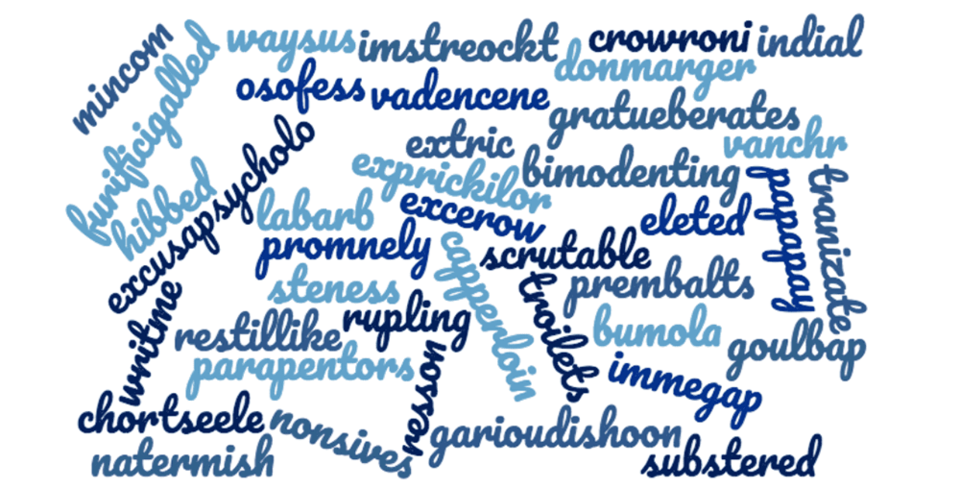Talk, jargon, and nonsense
When my daughter was in SK she came home one day with a story she’d written in a language my wife and I couldn’t understand. It was gibberish, a kind of alphabet soup, but she was delighted with what she’d written.
When I asked her teacher about the story she responded persuasively. She believed writing should be introduced as something that’s fun, an activity children can feel good about, and so she let them write in their own language to start with. If what they wrote made some kind of sense to them that was fine, but it didn’t have to. Same with painting, she said, they should feel comfortable with the medium and have fun with shapes and colours. If they could see a cow in a field that was all that mattered.
In time, by reading, listening and becoming aware of the accepted conventions of grammar, our daughter learned to write properly.
She went on to study English at Queen’s, then publishing at Ryerson, and she now manages a bookstore in Toronto. She reads more books in a week than I do in a month. Being introduced to writing freestyle without the compulsory figures apparently did her no harm.
I recently stumbled onto a website called the Random Word Generator that produces words like those my daughter invented when she was six. At the click of a key you get “Elislang,” for example, or “pectioniela” and “overally.” The app’s stated purpose is to release creativity and inspire the writer in all of us.

Yes, it’s all gibberish, but if it works why not? Yet there’s a downside to all this. Now that language can mean whatever you want it to mean, or mean nothing at all, we’re beset by people who use it solely to manipulate. I’m thinking of those who govern us, educate us and sell us things, all through the medium of jargon.
Here’s a crash course in current buzzwords.
We can circle back and move forward. The organic bandwidth is what it is, but if we do a deep dive we can unpack our true North Star. If we all give 110%, at the end of the day our impact will empower the grassroots. There’s been a paradigm shift in thinking, so now we utilize best practice to pick the low-hanging fruit and incentivize the team. Thinking outside the box and onboarding new ideas will raise the bar while leveraging synergy. Our board will operationalize town hall strategizing.
A friend recently posted this on a FB thread about language use. I think he was joking, but would it not all look and sound the same if he wasn’t?
Jargon is the Emperor’s New Clothes—an illusion of meaning and a parody of itself.
Whoever is versed in the jargon does not have to say what he thinks, does not even have to think it properly. The jargon takes over this task.(Theodore Adorno).
Writing and speaking are ways of thinking and feeling. Jargon relieves the user of the need to do either.
Writing and speaking are ways of thinking and feeling. Jargon relieves the user of the need to do either.
To illustrate: when I say my plan isn’t working, the meaning is clear; but saying there’s been a loss of functionality detaches the meaning. The phrase, like all jargon, becomes immunized against accountability. It’s all smoke and mirrors, and now the hallmark of public utterance in any profession.
Dr. Nancy Miller has written about our struggle to grasp words whose meanings appear self-evident but aren’t at all when examined. Some of her examples like self-actualization,connectedness, and relatedness, originated in humanistic psychology but now run amok, (and largely misunderstood), in corporate culture. They strike me as a kind of verbal abuse.
She refers to an online “BS Generator” that serves up ways to impress your colleagues. Three successive cursor clicks on my screen told me I could drive granular synergies, strategize impactful convergence, and deliver robust interfaces. Four more clicks showed me how to envision user-centric deliverables and dynamic paradigms, orchestrate visionary machine learning, incentivize proactive eyeballing, and disintermediate out-of-the-box channels.
Writer Joe Morin explains how this impenetrable shield of crap-speak can persuade the unwary to believe that what is advertised has already been achieved, that their “dining experience” is a done deal, that Cisco has indeed “woken the world up and moved the planet a little closer to the future.” Maybe this is what politicians of all stripes mean when they incant “going forward” during their robust deliveries of word salad.
So what’s the big deal, we ask. They’re just words, aren’t they?
It’s impossible to ignore that words are now so important we have language police to micromanage our use of them. They hit the correct key or the cancel button if they perceive or imagine a nuance of racism, sexism, homophobia or other slurs. There are words that have no place in civil discourse, though we should always remain free to debate unsettled issues in language that communicates.
Jargon isn’t hate speech but it can have sinister uses. There are dark implications to using words that look innocent but camouflage evil. In 1961, when American politicians were spraying the Vietnam invasion with scented terms like pacification, liberation, collateraldamage and friendly fire, the trial of Adolph Eichmann was taking place in Jerusalem. He too spun a defensive web of fallacy, using terms like emigrationspecialist to describe his genocidal role, and evacuationtransport to describe the death trains. He also remarked that constantdifficulties were caused by various offices in a bureaucratic manner, but that various types of possible solutions were discussed. These solutions included plans for murdering all the Jews in German-occupied Europe.
Language is the heart of any culture, as Dr. Miller reminds us. It’s much more than the dress of thought. It’s how we think. Or choose not to. ◆



